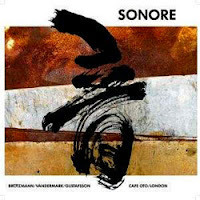Playing The Piano/Out Of Noise (Decca; 2011)
Known to most music fans for his excellent soundtrack work on The Last Emperor, The Sheltering Sky and Merry Christmas Mr. Lawrence among others, Ryuichi Sakamoto has been a prominent and revered figure in music for almost forty years.
Hopefully some will remember him from his first outfit, the late 70s/80s electronic group, Yellow Magic Orchestra (essentially the Japanese version of Kraftwerk). If not, you may be familiar through collaborations with Iggy Pop, Thomas Dolby, David Sylvian and more recently some outstanding releases with electronic sound sculpture, Christian Fennesz.
Hopefully some will remember him from his first outfit, the late 70s/80s electronic group, Yellow Magic Orchestra (essentially the Japanese version of Kraftwerk). If not, you may be familiar through collaborations with Iggy Pop, Thomas Dolby, David Sylvian and more recently some outstanding releases with electronic sound sculpture, Christian Fennesz.
But what most people don't always grab onto is, Sakamoto's emotionally powerful delivery at one single instrument--the piano. He is known for his masterful works electronically but in the last decade or so he has shifted between various styles. Delving into Brazilian themes with Jaques Morelenbaum or the aforementioned electronic work with Fennesz but at the heart it's still about Sakamoto's piano. His style is more angular yet remote. It has more to do with Debussy and Satie, than Monk and Jarrett.
His recent double release Playing The Piano/Out Of Noise is one of the best performances I have heard from Sakamoto in over a decade. This is why you fall in love with music. On Playing The Piano, he showers you with potent themes like the title piece to The Sheltering Sky. It rises and descends with grace and beauty that will cause both joy and despair all in the short span of minutes. "Amore" exudes the classic love/lost theme and might set forth those images of Debussy's writing in some listeners.
On one of Sakamoto's oldest pieces "A Thousand Knives" (in addition to "Tibetan Dance") is exquisite. Sakamoto's free flowing movement does cross both cinematic and jazz territories with great ease and effectiveness. It's always been a playful tune but its just connects more when heard as a singular instrument piece. Wonderful.
 With Out Of Noise, Sakamoto starts off in the same vein with pleasant, unassuming numbers led by the tranquil and hypnotic, "Hibari." This calm aesthetic soon gives way to a more dynamic atmospheric tone on "Still Life" and "In Red" in which he balances both a delicate touch on piano with decomposing chords delivered by collaborators Fretwork and Fennsez, respectively. "Firewater" is a mountain of a piece that is as haunting as it is vast, like staring into a red sunset. Sakamoto produces a wall of sound that quickly washes over you. Not dissimilar to Robin Guthrie and Harold Budd actually.
With Out Of Noise, Sakamoto starts off in the same vein with pleasant, unassuming numbers led by the tranquil and hypnotic, "Hibari." This calm aesthetic soon gives way to a more dynamic atmospheric tone on "Still Life" and "In Red" in which he balances both a delicate touch on piano with decomposing chords delivered by collaborators Fretwork and Fennsez, respectively. "Firewater" is a mountain of a piece that is as haunting as it is vast, like staring into a red sunset. Sakamoto produces a wall of sound that quickly washes over you. Not dissimilar to Robin Guthrie and Harold Budd actually."Composition 0919" is Sakamoto entering Glass/Reich-like territory with fast paced, repetitious patterns that stop/start and move from channel to channel. It's intoxicating and challenging. But that's what Sakamoto has always done. The tempo shifts quickly and the harmonics resonate with wonder and sweet agility. It's a solid way to close out the album and let the listner know that there's more to music than just the chords. This is thinking music for thinking people.
Playing The Piano/Out Of Noise are two of the best Sakamoto albums you are going to find in a vast catalog that I can't even count. It's also a great introduction to an amazing composer and performer. So if you haven't listened to Ryuichi Sakamoto before...now's a good time to start.











